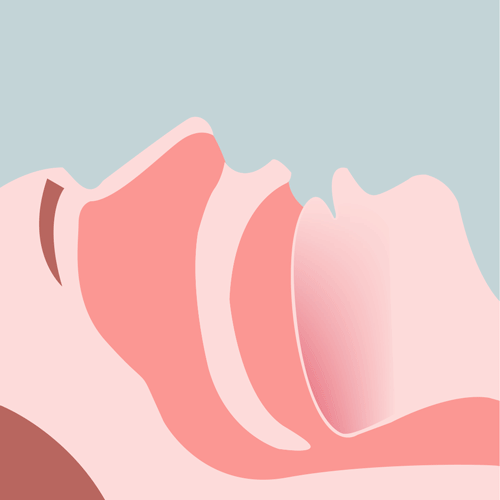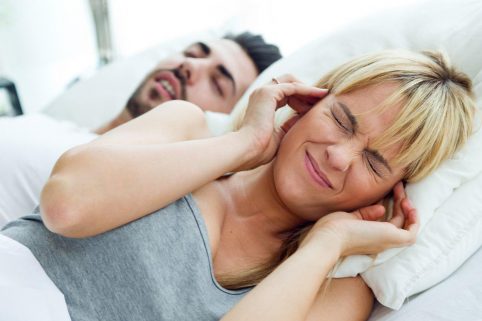Sleep Apnoea FAQ
Snoring is a snorting or rattling noise made during sleep. For some, it is limited to short individual snorts. For others, their snoring is consistent during all stages of their sleep and occurs every night. Similarly, some people’s snoring can be quite quiet, while others can be heard in the next room.
Here is an explanation as to why you snore, and how to stop it.
What causes you to snore?
As you sleep the soft tissue in your airways can relax and vibrates as air passes over it, causing the snoring noise. The soft tissue in the nasal passages, the soft layer at the back of your mouth, the base of your tongue, your tonsils or your uvula can cause you to snore.
When I’m awake, why don’t I make snoring noises?
When you are asleep, your muscles and body relax. This causes the soft tissue in your airways to loosen, making them soft and more susceptible to vibrations. The vibrations are the source of the noises. Plus, the loosened tissue reduces the size of your airway. This means air passes through the airway more quickly, and this increases the vibrations, causing you to snore. Often illnesses such as a common cold can cause your snoring to worsen, as it can further restrict the airways.
What can make you more likely to snore?
Many factors can affect the severity of somebody’s snoring. They include:
- Weight – being overweight or clinically obese can increase the amount of soft tissue around the throat. This increases the pressure on the throat during sleep, causing it to narrow further. Typically a person who is obese, and/or has a neck size above 17 inches, are more likely to snore. Often they will snore more loudly and more frequently than somebody of average weight.
- Smoking – smoke causes inflammation in the airway, restricting the airflow and increasing the likelihood of snoring.
- Alcohol – alcohol relaxes the muscles and makes the tissue in your throat and mouth more prone to vibrations.
- Allergies – any allergy that results in rhinitis (runny nose) will cause the nasal passages to become inflamed. This restricts them, making snoring more likely.
Often snoring worsens with age, as more tissue develops, and muscles weaken.
How to snore no more!
Now that you know what causes you to snore, you are better placed to find a solution. Proven treatment methods include:
Lifestyle Changes
If your BMI (body mass index) is above 25, you are likely to notice a reduction in the intensity of your snoring if you can lose weight. Reducing your weight may prevent your snoring entirely.
Stopping (or at least reducing) your smoking and or alcohol consumption can lead to a reduction in the severity of your snoring.
Anti-Snoring Products
There are numerous products to help people who snore. You can read our guide to the proven Anti-Snoring Products here.
Obstructive Sleep Apnoea testing
Being told that you snore may be embarrassing, but in most cases, snoring is harmless to the snorer and mostly an annoyance to the listener. However, if you experience any or all of these other problems, then it could be more serious:
- Excessive sleepiness during the day
- Lack of concentration
- You have been told you choke or stop breathing during sleep
- You have a BMI above 25
- Have a recessed jaw or deviated septum
- Need to urinate frequently at night
These problems are indicators that you might have obstructive sleep apnoea. Obstructive sleep apnea or OSA is a sleep disorder, where a person’s airway regularly closes, and they stop breathing during sleep. These regular interruptions disrupt sleep, causing the person to wake up not feeling refreshed and often tired throughout the day.
If you suspect that you may have OSA, then we recommend reading our guide to getting a Sleep Study conducted. You could be receiving treatment and sleeping soundly again within weeks. Even better – as well as treating OSA, you may also no longer snore!
Obstructive Sleep Apnoea – what you need to know
Obstructive Sleep Apnoea (OSA) is when apnoeas (breathing pauses) and hypopnoeas (breathing restrictions) repeatedly occur as your upper airway becomes obstructed. The obstruction is due to the relaxing of muscles and the subsequent collapse of the tissue surrounding the passageway, generally preceded by snoring. These pauses in breathing and reductions in airflow can be followed by a gasping/choking sound as the brain reacts to the oxygen drop, by momentarily waking you from your sleep. The sufferer can actually stop breathing for as much as 10 seconds (which is shown in the animation) with each event.
Sleep apnoea can occur up to one hundred times every hour.
The whole process then repeats regularly as the person drifts off into a deeper sleep only to be roused again soon after having another apnoea event. The individual is usually completely unaware of all this and rarely do they wake entirely but merely return to a lighter level of sleep. They then wake up still tired, having had little or no quality sleep.
Symptoms of Obstructive Sleep Apnoea
Obstructive sleep apnoea (OSA) is a pause in your breathing when you are asleep, caused by an obstruction; usually the soft tissue around your airways. Episodes of interrupted breathing are often easily observed by someone when an individual is sleeping, but the sleeper might not know it’s happening. Obstructive sleep apnea or OSA can also cause other symptoms, usually due to tiredness resulting from a lack of deep sleep.
Most people with OSA snore loudly. Their breathing may be noisy and laboured, and it is often interrupted by gasping and snorting with each episode of apnoea.
If you have OSA, you may have no memory of your interrupted breathing during the night. However, when you wake up, you are likely to feel as though you have not had a good night’s sleep.
Signs and Symptoms of Sleep Apnoea:
- Gasping or choking during sleep
- Snoring
- Feeling excessively tired during the day
- Anxiety
- Depression
- High Blood Pressure
- Lack of interest in sex
- Irritability and a short temper
- Poor memory and concentration
- Frequent toilet visits during the night
- Headaches (particularly in the morning)
- In men, impotence
The perfect range. Exactly what you need.
Whether you need help with snoring, Sleep Disordered Breathing or Sleep Apnoea, the INTUS Healthcare range has something for everyone.








